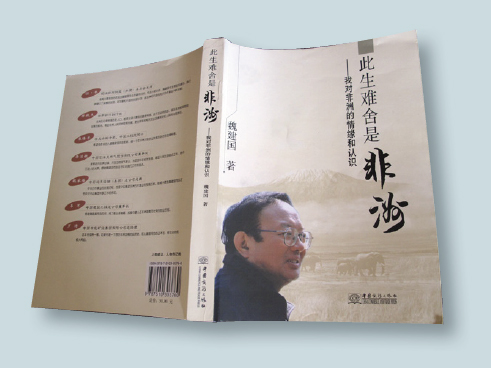|

Wei Jianguo is a familiar name in Africa. A star in the contemporary history of Chinese-African relations, Wei's experience is notable in many ways. He has worked in the field for 40 years, which marks the longest tenure among his peers. He has been to every one of the continent's 54 countries (11 countries a year), making him a record-holder of sorts. And he has held a high position among government officials working in the field of China-Africa exchange. He details these and his other experiences in Africa in an autobiography that was published September last year. The book is a meditation on all things about China-Africa.
It's quite common in China for a book written by a government official to gain encyclopedic status, just as a general rule. But in a departure from the normal trajectory, Wei's book was also commented on more than 3,000 times on the Internet. His life's memories and feelings about the African continent seem to have moved many people very deeply.
The book is nearly half a million words long. It records the history of Sino-African exchange in politics, economy, finance, transportation, mining, industry, medical care, agriculture, space science development, handicrafts, public charity and cultural communication, among others.
Wei's career path can be traced from his days as junior staff to his appointment as a high ranking official working in the arena of Sino-African economy and trade. His high position provided him first-hand access to the latest statistics in these fields on a regular basis, but he also kept constant tabs on historic events and logistic issues during his years in the job. This information in concert with his insights is of great value and use for both African and Chinese readers alike.
The book additionally features a collection of 167 photos – pictures that capture many key moments in Sino-African history and achievement. Many are black-and-white.
Beyond the photos, Wei's writing itself works as an illustration or historical panorama. In his role of author, he unveils many moving details. At one juncture he talks about how Mao Zedong, ill and unable to meet an African president who was visiting China, strove to write a 9-page apology letter. At another, he recalls the aftermath of the Wenchuan earthquake in 2008, when many African countries donated generously to their neighbor to the east. Chinese-constructed buildings on the African continent had weathered well so far whenever earthquakes hit. These and other events, Wei says, have built a solid foundation for Chinese-African relations. He also makes room for answers to questions like "What are China's four newest great inventions?" and "Why is Tiger Balm so useful?"
About 220 names are mentioned in the book. These include government officials, experts, scholars and regular people from both China and Africa. They all make history with their prompt decisions, creative suggestions and devoted efforts. They all, according to Wei, have contributed to this great friendship. Some stories are impressive, like the one about Dr. Lu Chunming, who tested an anti-malaria drug on himself, or the one about translator Wang Xuyang, who braved a cannibal tribe to save a hostage. Wei also reflects on Chinese people who became assistants to African presidents, and those who were awarded honorary chief status in various tribes. Their experiences will stay imprinted on readers' minds long after they have finished the book.
(The author is a veteran editor) |